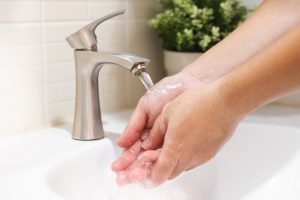Do You Need a Water Softener in Crystal Lake, Illinois? Four Signs That You Do
 Odds are, you’ve probably heard of a water softener before. However, you might be wondering: should you install a water softener in your Crystal Lake home? In all likelihood, there’s a good chance that you should — Crystal Lake water (like all water in Northeastern Illinois) has a reputation for being “hard”.
Odds are, you’ve probably heard of a water softener before. However, you might be wondering: should you install a water softener in your Crystal Lake home? In all likelihood, there’s a good chance that you should — Crystal Lake water (like all water in Northeastern Illinois) has a reputation for being “hard”.
You don’t have to just take our word for it. Instead, you can look out for some specific signs that your water might be hard. Are you curious as to what these signs are? If so, then you’ve come to the right place. We’re going to provide you with four examples below.
1. There’s Limescale on Your Faucets and Showerheads
An obvious sign that your water is hard is that there’s limescale on your faucets or showerheads. At its core, limescale is a small collection of calcium and magnesium particles (the minerals that hard water consists of). It’s left behind as a white, powdery substance after hard water has evaporated from a surface.
There’s nothing dangerous or destructive about limescale. It just looks bad and can impair the aesthetic of a home. As such, many homeowners prefer to eliminate it altogether. Fortunately, it can be permanently removed by installing a water softener.
2. Your Water Pressure Is Low
Another sign that you might have hard water running through your pipes is that your water pressure is low. What does hard water have to do with low water pressure? It’s all about the effect that hard water has on your pipes.
Over time, the calcium and magnesium in hard water build up on the interior walls of water pipes. As a result, there is less space for water to flow through, and low water pressure is the result. In some extreme cases, water pipes can become blocked up entirely, completely restricting the flow of water.
Now, this isn’t the only cause of low water pressure. In fact, there are a number of other causes as well. However, if your water pressure is getting progressively lower over time, it’s something to consider.
3. You’re Producing Few Soap Suds
When water mixes with soap, it’s supposed to create plenty of soap suds. These soap suds assist in the cleaning process, helping to kill bacteria.
The problem is, when water is filled with calcium and magnesium, it doesn’t react easily with soap. As a result, it doesn’t allow as many soap suds to form, which makes things much more difficult when trying to clean.
If you’re seeing relatively few soap suds, there’s reason to believe that your water is hard. If you would like to have more suds, your best option is to install a water softener in your home.
4. There’s Buildup Inside of Your Water-based Appliances
One last sign that you have hard water is that you have mineral buildup on the inside of your water-based appliances. These can include appliances such as dishwashers, refrigerators, washing machines, coffee machines, and more.
This buildup is likely due to the presence of calcium and magnesium, and it can have a negative impact on your appliances. Not only can it hurt the efficiency of your appliances, but the lifespan as well.
Fortunately, a water softener can remove the calcium and magnesium from your water supply, which significantly reduces the risk of internal mineral buildup.
Looking for a Water Softener in Crystal Lake, Illinois?
Could your home benefit from a water softener? Looking to install a water softener in Crystal Lake, Illinois? If so, we here at Johnson Water Conditioning have you covered.
Our team has installed water softeners in countless Crystal Lake area homes. Regardless of the size of your home, we have a water softener that will suit you.
Contact us today to get started!

 Better Water for
a Better Life
Better Water for
a Better Life
